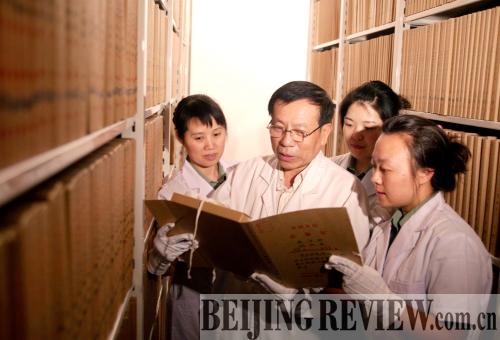|
 |
|
UNSTOPPABLE: Liu Yiquan (second left), a PLA archivist, searches for documents to trace missing U.S. military personnel who disappeared during the Korean War period (WANG ANMIN) |
Beverly Shaver had been married just three months to 24-year-old U.S. Navy pilot James Brayton Deane Jr. when his plane was shot down off China's east coast in 1956.
The navy told the families of 12 crewmembers aboard the plane including Deane, whose bodies were never found, that their loved ones died during a top-secret mission. After nearly four decades, another husband and four grown children later, Shaver accidentally read a book on American prisoners of war and started to suspect that her first husband might have been captured alive and be living somewhere in China.
Desperate for answers, Shaver turned to former U.S. Defense Secretary Donald Rumsfeld, Deane's fellow pilot and the couple's close friend, for help. During Rumsfeld's first visit to China as the U.S. Defense Secretary in October 2005, he asked whether China's military archives department could compile detailed information on the crash 49 years ago from their records.
A year later, when Guo Boxiong, Vice Chairman of the Central Military Commission, visited the United States, he surprised Rumsfeld with an unexpected gift—a military document that chronicled the last two hours of Deane's flight before it was shot down. The document, accurate to the second, convinced Rumsfeld that it was impossible for his close friend to survive the crash or be captured.
Liu Yiquan, one of China's most seasoned military archivists, and his colleagues, found the 50-year-old document after combing through mountains of material over the course of many days.
"We all know the anxiety people feel when a valuable item is missing, let alone a family member," Liu, 59, once told a colleague.
During his 38-year career as a military archives collector and researcher, Liu has regarded the recovery of the records of service members who were missing or killed in action as an important part of his work. He believes that finding the records of service members' deaths and informing their families restores a human being's last dignity and is something that everyone deserves.
Liu has collected battle records for nearly 10,000 People's Liberation Army (PLA) service personnel who were killed in different periods and he helps to have their names inscribed on monuments.
In June 2008, 90-year-old Li Qingren wrote a letter to the PLA Archives, where Liu works, hoping to find information on his elder brother, Li Qingyong. Li joined the Red Army in 1930 and soon lost contact with his family. Liu volunteered to take on this seemingly impossible mission. After reading numerous military documents, Liu finally found Li Qingyong's name on a list of soldiers killed in a battle and informed his brother, who had been waiting for such confirmation for nearly 70 years.
Liu has worked as one of four experts on a cooperative program established in 2006 between the Chinese and U.S. defense ministries to find information on U.S. military personnel who were classified as missing in action during the Korean War (1950-53) period. Liu was given the task of combing through more than 60,000 of the hundreds of thousands of military documents that span the years from 1950 to 1958 for any information that could be used to trace missing U.S. service members.
Due to China's economic difficulties during the time, very few of the documents were typed and, on some, the handwriting was tiny. They were written in traditional Chinese, a different character set from the simplified Chinese that is used today. It was difficult to read some of the documents because they were written on poor-quality paper, which made the characters too blurry to make out. Moreover, the writers of the handwritten records, especially battle accounts from batteries or squadrons, were sometimes semi-literate soldiers, who dotted their writings with drawings to replace complicated Chinese characters that they did not know how to produce.
These difficulties could only be overcome by professionalism and expertise that has been accumulated over a long time, which Liu possesses. He has collected more than 830,000 military documents over the last 20 years.
To make sure he did not skip any possible sources, Liu worked overtime to read documents assigned to him, often sitting over one piece for hours with a magnifying glass in hand. When he was diagnosed with rectal cancer in September 2008, Liu had finished combing more than 50,000 documents.
After having surgery to remove a tumor, Liu returned to work and refused colleagues' suggestions to take a long sick leave. Between his chemotherapy and radiotherapy treatments, he worked seven-hour days until he was hospitalized in June with cancer that was spreading to other organs of his body.
When a delegation from the U.S. Defense Department visited the PLA Archives in April, Navy Rear Admiral Donna L. Crisp, Commander of the Joint Prisoner of War/Missing in Action Accounting Command, met Liu and was touched by his professionalism after being told his story. After going back to the United States, she wrote a letter to Director of PLA Archives Ji Yingchun, in which she said, "I appreciate the importance you and your staff place on our humanitarian mission." | 